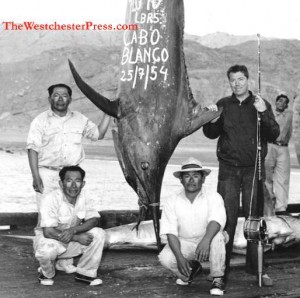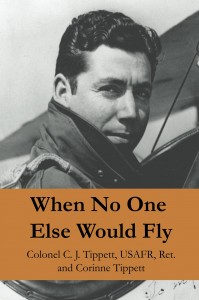
Colonel C. J. Tippett and his big, though not record-setting, and obviously not catch and release, black marlin rod and reel catch, at the Cabo Blanco Fishing Club in Peru.
Colonel C. J. Tippett had the unique opportunity to participate in some of the best big game fishing in sport fishing history. The world record for black marlin fishing is still held by one of the men that Tip fished alongside, and from the waters where he fished. Alfred C. Glassell, Jr., caught the record 1560 pound black marlin at the Cabo Blanco Fishing Club in 1953, and Tip was there.
Tip himself caught black marlin, big-eye tuna, blue-fin tuna, mako shark, swordfish, sailfish, and held the world record for roosterfish until someone else caught a bigger one in the 1990s.
It was an amazing, exciting, glamorous time and when it ended, it wasn’t directly because of the sport fishing activities, but our modern eyes have qualms when we look at the size and species of the trophy pictures taken on the Cabo Blanco docks. Today, we know that those species are now endangered, and some of us wonder….
But rod and reel big game sport fishing was not, and is not now, the reason billfish populations are declining worldwide – it is longlining.
Longline fishing is a commercial fishing practice of setting baited hooks over miles and miles of open ocean. It kills large numbers of many species without regard to fish populations, sex, age, size, or season.
And it was the sport fishing industry who led the most vocal movement for a change in fishing laws – attacking not the commercial fishermen directly, but their marketplace instead. A far more effective method of influencing the fishing industry – which is, after all, a business.
The International Game Fish Association was a major champion of the recently successful Billfish Conservation Act, which prohibits the importation of all billfish (except swordfish) into the United States. Taking marlin off the menu in America.
The legislation was signed in 2012. The United States had been the biggest buyer of billfish catches in the world,
and now – it is not.
Several of the men who fished Cabo Blanco’s abundant waters in the 1950s went on to become highly recognized wildlife conservationists later in their careers. Conservation was not an active conversation point in the 50s; time that saw the heyday of big game hunting, big game fishing, and record setting adventure.
The 1950s were the height of the Cabo Blanco Fishing Club’s fame and fortune, and Tip wrote about his adventures as club director in the very-soon-to-be-released book, “When No One Else Would Fly“. Check Amazon.com for a copy, or join our b00k release notification list by contacting us.
« Definitions in Self Publishing… like Do It Your Self Publishing Changing Passwords Frequently Is An Opportunity for Positive Thinking »



Times have definitely changed since these previous days. Conservation is key to keeping these giants swimming in our waters for many years into the future.